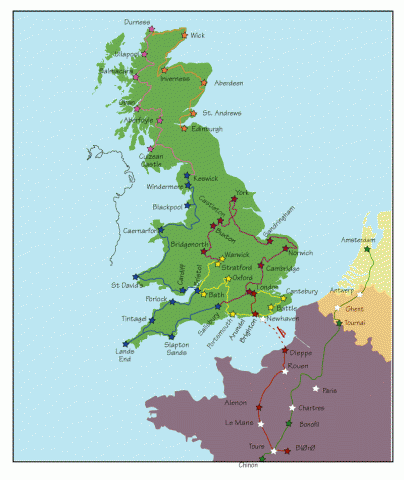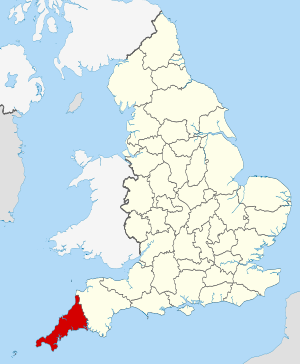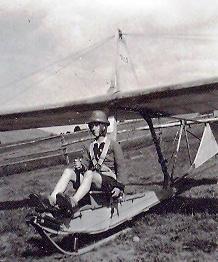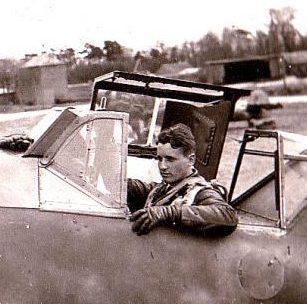A close encounter between wartime rivals only revealed 74 years later
On August 28, 1942, kite-flying four-year-old John Lewthwaite of St. Just, Cornwall got a "cheery wave" from Lt. Poldi Wenger as he flew by at very low level on his way to Penzance.

By Carolyn Yeager
copyright 2016 Carolyn Yeager
IT'S A STORY THAT ALWAYS BEGGED TO BE TOLD, but the sensitivities of the English concerning the bombing by Germany in 1940-42 made it one that John Lewthwaite was hesitant to tell. Even today.
So he wrote to me with his tale.
The encounter took place seventy-four years ago this month on August 28, as he remembered it. Lewthwaite was only 4 years old, but he's sure of what he experienced on that summer afternoon while out flying kites with a friend, in a field just north of Lands End.
 Map shows the relationship between the French and English coastlines, and the location of Lands End at England's southwesterly tip.
Map shows the relationship between the French and English coastlines, and the location of Lands End at England's southwesterly tip.
It was wartime and the members of squadron 10/SG2/JG2 Richthofen had been coming over to shoot up and drop bombs on industrial targets and ships in southwest England since July. Lieutenant Leopold Wenger, just 20 years old, had been transferred to Beaumont le Roger at the end of May 1942. On June 13, he wrote his family that he had been assigned to a new type of plane, the Focke Wulf 190 (A-2), a fighter-bomber. He made his first combat flight with it on June 29, reconnoitering the southern English seacoast between the Isle of Wight and Selsey Bill.
On July 9, his squadron attacked an English convoy of ships west of Portland, in Dorset, sinking a 2,500-ton ship for which he received his first war medal, the Iron Cross 2nd Class. On July 12, Poldi sank an 800-ton watch ship in the harbor of Brixham in the Bay of Torquay. After more successes, on July 21 his unit was transferred again. It wasn't until August 4th that he flew to Cornwall, in the vicinity of Falmouth, what he described as “the western corner of southern England.” A mission beset with difficulties, he commented that the long stretch of water to cross was already enough to wear one out, then he and his wingman ran into very bad weather, plus he lost his altitude control on the way back – managing to arrive intact however at his home port “shook up like never before.”
On August 12, he was awarded the Iron Cross 1st Class for destroying the gas works in Salisbury. Then on 19 August, in the early morning hours he received an emergency report to take off immediately with three planes for an armed reconnaissance mission in Dieppe, where the English were attempting a surprise landing. Leopold ended up flying three successful missions destroying enemy ships at Dieppe. After all that excitement, he didn't write home again until August 30th.
30 August 1942: I was over there again a few days ago, in the vicinity of Falmouth in Cornwall. You couldn’t see any ships, so they must have been keeping to their secondary targets. We blew up a few fine houses according to the motto “Never miss an opportunity”.
This corresponds to August 28th in Leopold's logbook, when he flew to Fowey (in the 'vicinity of Falmouth“), then passed by St Just on his way to Penzance at a very low level (5 to 10 meters) to stay underneath the radar. As Willy confirmed to me, the logbook showed:
28th August 1942 : Order of attack 2 jabos type FW 190
Leader Lt. Poldi Wenger
Departure Morlaix, France at 15h41 - Landing Morlaix, at 16h48 = 67 minutes-flight
weapon: SC500 bomb
Clear up the movement in the sea around Fowey
direct hits on living houses at the town of Penzance
Little John Lewthwaite and his friend happened to be playing in a field and … well, I'll let him tell the story just as he wrote it to me in May 2015.
Dear Carolyn,
On 28 August 1942, at age 4, I was with a friend flying kites in a field just North of Lands End, when two aircraft roared low towards us. We assumed they were RAF Spitfires, then saw their Luftwaffe markings....Terrified, we just stared at them, anticipating a hail of bullets, but instead received a cheery wave from the nearer pilot! Subsequent research has revealed they were FW 190's en route to attack St.Ives and Penzance, and that the leading aircraft (the one nearer me) was flown by young Leopold Wenger. I had hoped he might still be alive, but was saddened to read he was killed not long before the end of that wretched war, and therefore I could not thank him for the apparent humanity which served to influence my thinking thereafter... Is it possible for me to have some means of contacting his family in some way to redress this frustrating situation? Thanks.
____________________________________________________________________

Cornwall is the size of Rhode Island
It's important to keep in mind that Cornwall is only slightly larger than Rhode Island in area – 1,376 sq. miles. The town of St Just is the most westerly town in mainland Britain and is situated only 8 miles (13 km) west of Penzance on the opposite coast.
____________________________________________________________________
I did get Willy and John in touch and they carried on a correspondence that still continues – as Willy has done with so many Englishmen and Canadians from "that wretched war'' who encountered his brother in one way or another.
Wenger assured me: ''This was not a fantasy by the little boy. When you know Poldi, that was just like him - his way to be in a good mood, to show a friendly face for the English boy to remember. I also think that the little boy must have reminded him of his younger brother Gerhard who was about the same age. Bibi loved his brother.''
Indeed, Gerhard Wenger was born in June 1939, his birth inspired by the Anchluss. The fourth child in the family, he was separated from Poldi by 17 years. Poldi was very close to his family, always thinking of them, making sure he brought chocolate to the two young ones when on home leave. Gerhard would have been 3 years old in August 1942, and Leopold would surely have been reminded of his little brother when seeing the two British kiddies with their kite.
The Wenger brothers in summer 1942:
Left: In July 1942, sixteen-year-old Willy received his C license for glider pilots, hoping to follow in his brother's footsteps as an airman; he is pictured seated in a glider. Right: In April 1942 (no pictures from July-August), Leopold was stationed in Le Havre, here on stand-by duty in his Me 109.
So the remembered encounter from so long ago is confirmed as fact … a true story that can warm the heart and instruct the mind today. A young German pilot under orders to fly as low as possible, staying under the radar, has a close encounter with a four-year old child of the 'enemy' who reminded him of his own dearly-loved little brother ... surprising that child with a wave and a smile that cemented in his impressionable mind a likeable image of the legendary 'fearsome Hun' across the Channel.
By sharing his story, John Lewthwaite has given us a valuable gift of REALITY to help counteract the false propaganda of the conflict between cousins, the so-called battle of Britain of 1941-42. New connections have been made, friendships forged, and who knows what yet might come because of it. A good and considerate man, John didn't send me the photograph I requested from him, maybe because, as he confided to me in a second email:
Bizarre world in which we now live....I cannot believe I have now been able to circulate the photo of the glamorous young 'Poldi' Wenger amongst my admiring daughters! But Heaven only knows what my Hun-hating grandparents would have thought of all this...
- Enjoy this video where you can see the Cornwall coastline from the air, as Poldi saw it. You will see Fowey, Penzance, Lands End, and St. Ives named, among many other places.
Tags
Lands End, Penzance, Falmouth, Cornwall, Focke Wulf 190, English Channel, 1942Category
Leopold Wenger, Willy Wenger, World War II- Printer-friendly version
- 2236 reads












Comments
wonderful story, poldi wenger
my heart was warmed as you say. happy to note the humanity of our germans!!!
They Did It, Too (First?)
It would appear the Luftwaffe pilots, like their opposite numbers on the Allied side, did not scruple to avoid targeting RESIDENCES when better targets were not found.
C'est la guerre, I suppose. Anyway, it's interesting to note the apparently free admission on the part of the perpetrator(s).
Mr. Libertarian
Jett, your effort to make the German bombing of England commensurate with the English bombing of Germany is ridiculous.
The Luftwaffe orders were often in reprisal for the carpet fire-bombing of German residential areas and national treasures, which the pilots were fully aware of. Willy Wenger said by August 1942, Luftwaffe pilots were sometimes told they could bomb famous landmarks for that reason, along with residential, but hardly did so. Plus Leopold Wenger's squadron were in small, one-man fighter-bombers, not big heavy strategic bombers with 5-man crews, and they traveled two planes together, not 500 to 1000!! So, get real!
Here is what led up to Poldi's hitting those few big houses in Penzance (not worker's housing) in August: On 14 February 1942, the Area bombing directive was issued to Bomber Command. Bombing was to be "focused on the morale of the enemy civil population and in particular of the industrial workers." Though it was never explicitly declared, this was the nearest that the British got to a declaration of unrestricted aerial bombing – Directive 22 said "You are accordingly authorised to use your forces without restriction", and then listing a series of primary targets which included Essen, Duisburg, Düsseldorf, and Cologne. Secondary targets included Braunschweig, Lübeck, Rostock, Bremen, Kiel, Hanover, Frankfurt, Mannheim, Stuttgart, and Schweinfurt. The directive stated that "operations should now be focused on the morale of the enemy civilian population, and in particular, the industrial workers".
In March 1942, 234 aircraft bombed the ancient Hanseatic port of Lübeck. The ancient timber structures burned well, and the raid destroyed most of the city's centre. A few days later, Rostock suffered the same fate.
On 30 May 1942, 1,046 bombers dropped over 2,000 tons of high explosive and incendiaries on the medieval city of Cologne, and the resulting fires burned it from end to end. The damage inflicted was extensive. The fires could be seen 600 miles away at an altitude of 20,000 feet. Some 3,300 houses were destroyed, and 10,000 were damaged.
Two further thousand-bomber raids were conducted over Essen and Bremen.
Spare us your use of the word "perpetrator."
Story
Nice story, thanks.
Close Encounter 74 years later
Great Article. Reminds me of the book "A HIgher Calling" a book about about a ME-109 Pilot who escorted a shot up B-17 out to the English channel after the B-17 had completed a bombing run into Germany. A great book and a great read.
With this article more and more articles are surfacing about the humanity of the Germans and their behavior during the war which saw more death and destruction to Germans and Germany than to all the Allies combined